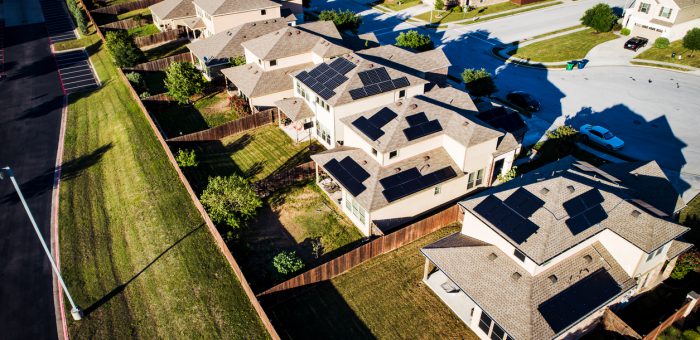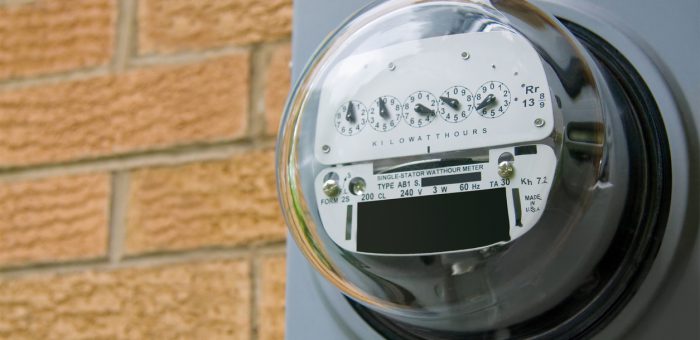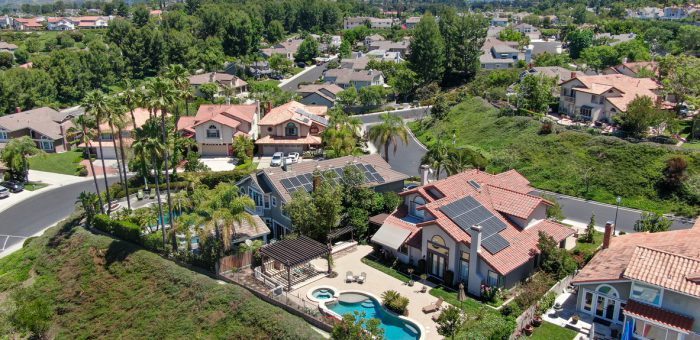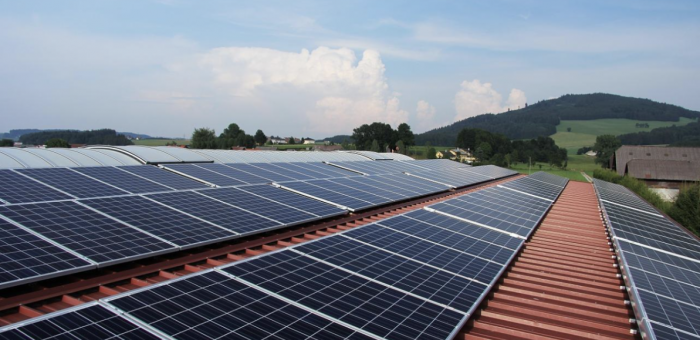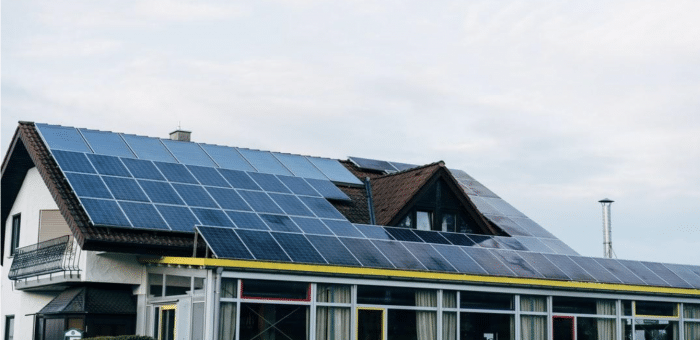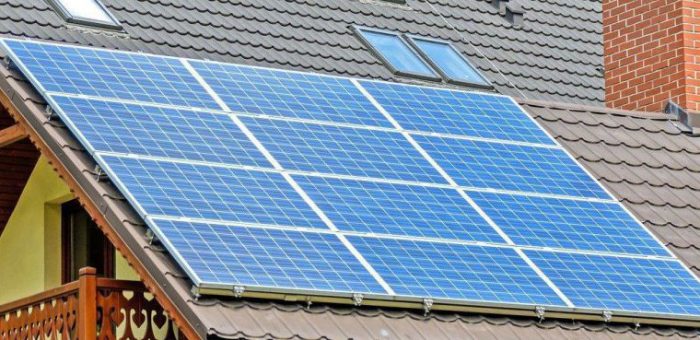As solar technology advances, it gets more affordable — especially with current government incentives bringing the cost down. Power Wizard can help you shop for solar and enhance your savings by finding you an electricity plan that best suits your needs and doesn’t include any hidden fees.
But, since solar technology is new, choosing your solar energy system can be confusing. Learn how solar energy systems work and what to consider when you buy one.
How Solar Panels Work
Solar panels are a collection of many photovoltaic (PV) cells that absorb energy from sunlight. This energy knocks loose free electrons that form an energy flow in response to the cell’s internal electric field, generating an electric current that can power your home.
In residential areas, you may see them on roofs to maximize sun exposure and minimize shade.
They can work during cloudy days, though not at night. Instead, you can set up a battery to store surplus energy during the day and release it to power your home at night.
What to Consider When Shopping for Solar Energy Systems
The most important factors in weighing your solar panel options are the cost and the savings the system will provide. Consider the following.
Upfront Cost and Manufacturers Warranty
As with any investment, your budget heavily influences the solar energy system you buy. On average, solar panels cost around $16,000, though depending on the type and model they can range from $3,500 to $35,000.
Types of solar panels you might consider are:
- Monocrystalline panels, on average $1 to $1.50 per watt
- Polycrystalline panels, at $0.90 to $1 per watt
- Thin-film panels, also at $1 to $1.50 per watt
Look at the warranty to estimate the panel’s lifespan. A standard warranty should offer at least 10 years of protection. Solar panels come with two types of warranties:
- Performance warranty. Manufacturers offer a performance warranty to guarantee the panel will perform better than a specified degradation rate for typically around 25 years. Note that it only guarantees each individual panel can produce a certain amount of power, not that your system will produce a specific amount of power.
- Product warranty. This type, also called materials warranty, usually guarantees the equipment will work for 10 to 12 years without fail. Some premium manufacturers or lines offer up to 20 or even 25 years.
Solar companies also may offer labor and service warranties to cover the labor in swapping out the panel module. These usually last between three and 10 years.
Average Energy Consumption and Financial Incentives
To figure out if a solar energy system will help you save on your energy bill, determine your average energy consumption for the last year. The energy production of an average solar panel is 170 to 350 watts per hour. Some factors that affect this include:
- Panel wattage. This is the amount of electricity a panel can produce. Most residential panels have a rating between 300 and 370 watts.
- Number of cells. If a panel has more cells, it can generate more power. Panels can have any number of cells, from 18 for RV solar panels to 96 for utility solar farms.
- Amount of sunlight available. Since solar panels need sunlight, they can generate more power if they receive more sunlight to charge them.
Compare your average energy consumption with each system’s estimated energy output to learn if it will save you money. To keep your electricity costs as low as possible, become a Power Wizard member and find the plan that best fits your energy needs.
Financial incentives can also help you shop for solar system. Since governments are encouraging people to adopt clean energy, there are many solar incentives available right now, including:
- Tax credits. You may be eligible for a federal tax credit of 26% for a system you install in 2022 and a 22% credit if you install one in 2023. Your state may also offer state tax credits.
- Some utility companies, local governments, and other organizations run rebate programs that offer you a partial rebate after you buy a solar system. You will need to file for the rebate to receive it.
- Property tax relief. Solar power systems are exempt from property taxes in some states.
- Solar renewable energy certificates (SRECs). If you’re a homeowner in a participating state, you can earn SRECs for the solar power you generate. You can sell these credits on a local marketplace to utility companies.
- Performance-based incentives (PBIs). Your net metering agreement with your utility company may include incentives that award you a flat-rate payout for every kilowatt-hour of solar energy you generate.
Solar Panel Efficiency and the Return on Investment
Panels generally process 15% to 22% of solar energy into usable electrical energy. The efficiency of your solar panel depends on a few factors:
- The type of panel
- The incline, orientation, and wiring of the panels
- Sunshine hours and the temperatures throughout the year
- The efficiency of the solar inverter converting power to a direct current
Weather conditions through the year, like snow and wind, can also affect efficiency by damaging the panels. Make sure your panels have undergone extensive testing under extreme conditions, because these could affect your return on investment (ROI).
The ROI for solar panels is usually positive, especially since incentives ease the system’s initial cost. In the United States, the average ROI on solar panels is around 10%, though it varies depending on where you live and your home.
You can calculate your ROI for different solar panels by weighing your net installation cost after one-time incentives against your expected electricity bill savings and ongoing incentives. If that seems complicated, many websites also offer solar ROI calculators. To maximize ROI, use Power Wizard to save in additional costs your power company may be charging you.
Types of Solar Technology
When you shop for solar, there are three types of PV solar panels you may buy.
Thin-Film Solar Panels
Thin-film panels are a new technology that are great for houses with shading issues and a lot of available space. They’re easy to mass-produce and work well in high temperatures and shade. If necessary, they can also be flexible.
But they take up the most space, and they tend to degrade faster than the other two options, so they’re not as useful for many residential situations.
Polycrystalline Panels
These are simple to make and low-cost, and they work better in higher temperatures than the other two options. However, their efficiency is lower, at only around 14% to 16%, and they still require a large space.
Monocrystalline Panels
As the oldest and most developed PV technology, monocrystalline panels are the most energy-efficient and have a long lifespan. They also take up less space than thin-film solar panels, making them more useful for residents, and they’re generally more efficient in warm weather.
Battery Backup
A battery backup stores solar power so your system will stay online whether the power grid is up or down. If you live in an area with an unreliable grid, you should include a battery backup in your system to have power at all times.
How to Choose Which Option Is Best for Your Energy Needs
To get the most savings from your solar panels in Texas and find the best solar energy system plan for you, become a Power Wizard member. With this membership, you can save hundreds on your electricity bill and be helped when shopping for solar panels. Texans have overpaid more than an estimated $28 billion on electricity in the last 20 years in hidden additional fees. Don’t let your switch to solar energy come with a plan that adds to that. Reach out to Power Wizard today to learn more.
